Recent Water Damage Posts
Signs of Hidden Water Damage from a Leaking Pipe in Pine Ridge Business?
12/23/2024 (Permalink)
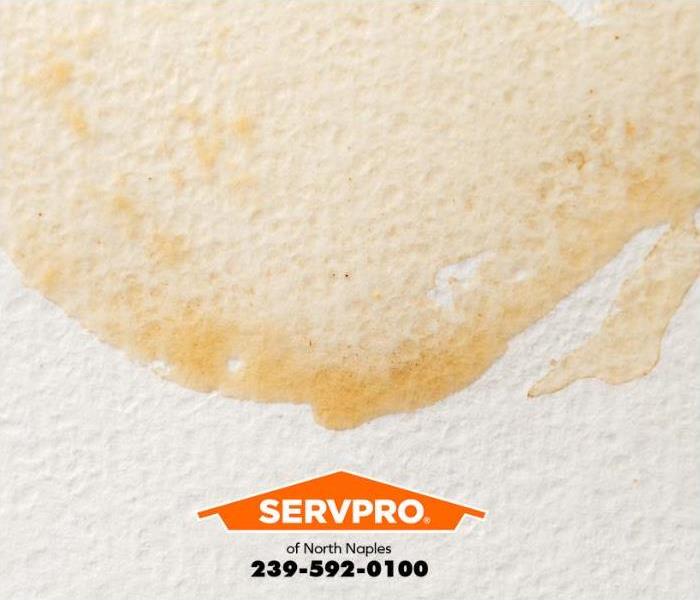 We respond to water damage emergencies 24/7 in Collier County.
We respond to water damage emergencies 24/7 in Collier County.
A pipe leaking in a Pine Ridge commercial building can quickly escalate from a minor nuisance to a significant issue, causing extensive water damage and disrupting operations. Even a small, steady leak can lead to water buildup behind walls, under floors, or around ceilings, creating structural concerns and ideal conditions for mold growth. Addressing a leaking pipe swiftly is crucial for businesses to prevent further complications and maintain a safe, functional environment.
Our local North Naples team understands the urgency of commercial water damage restoration. When a leak is detected, our team responds promptly to assess the damage, identify the source, and implement effective water removal and drying techniques. Using advanced equipment, we extract water, set up dehumidifiers, and monitor moisture levels to ensure a thorough drying process. In cases where water has affected sensitive materials or equipment, we work carefully to restore the property to its pre-damage condition.
Beyond physical repairs, our team also assists with documentation for insurance claims, making the restoration process smoother for business owners. With our experience in water damage restoration, we help commercial properties recover quickly, allowing businesses to resume operations with minimal downtime.
Call Us Today!
SERVPRO Team Zubricki is proud to be SERVPRO’s Franchise of the Year 2024. When your commercial business or home in Pine Ridge has water damage from a broken pipe, our local team in North Naples is Here to Help®.
SERVPRO® franchises are independently owned and operated.
Why Water Heaters Can Fail and Cause Water Damage in a Home in Pine Ridge?
12/3/2024 (Permalink)
 We respond to water damage emergencies 24/7 in Citrus County.
We respond to water damage emergencies 24/7 in Citrus County.
Our local North Naples team is trained and certified to restore water damage in Pine Ridge quickly and efficiently. Water heaters are one common household appliance that can fail and cause significant water damage if not properly maintained.
One of the most common reasons for water heater failure is corrosion. Over time, the metal components inside the water heater, especially the tank, can corrode due to constant exposure to water. If the anode rod, designed to attract corrosive elements, is not replaced when needed, the tank itself may begin to rust and develop leaks.
Sediment buildup is one reason water heaters fail because minerals in the water can accumulate, leading to reduced efficiency and eventual overheating, which can damage the tank and cause leaks. Pressure relief valve malfunctions can also result in water damage. The pressure relief valve can also fail and cause water damage. This valve is designed to release excess pressure, but if it fails, pressure can build up in the tank, causing leaks or bursts.
Old age is another contributing factor. Most water heaters have a lifespan of around 8-12 years or longer if maintained properly. Regular inspections and maintenance can help prevent water heater failure and avoid costly water damage in a home.
Call Us Today!
When your Pine Ridge home or commercial business has water damage, our local team in North Naples is Here to Help. ® Contact us today at 239-592-0100.
SERVPRO Team Zubricki is proud to be SERVPRO's Franchise Of The Year for 2024.
SERVPRO® franchises are independently owned and operated.
The Impact of Scaling on Water Flow and Plumbing Pipes in Naples, Florida?
11/19/2024 (Permalink)
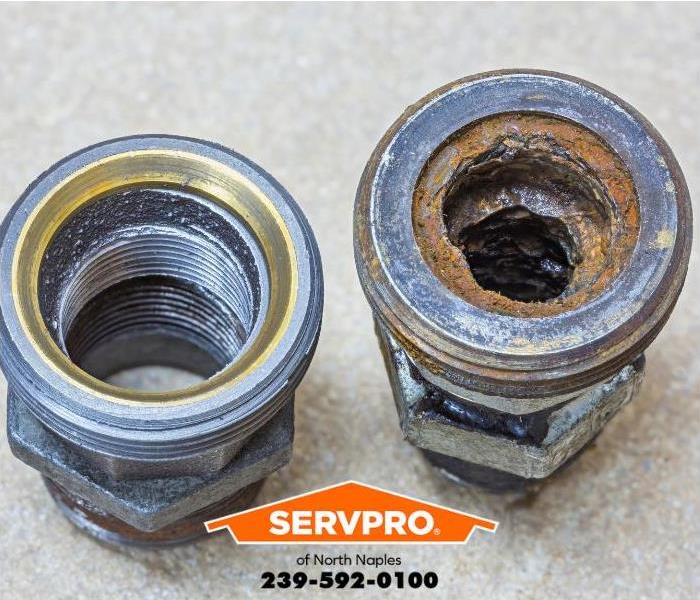 We restore water damage 24/7 in Collier County.
We restore water damage 24/7 in Collier County.
Our local North Naples team restores water damage in Naples every year. Scaling is a common issue in plumbing systems, especially in areas with hard water. Over time, minerals like calcium and magnesium in the water accumulate inside pipes, forming a layer of scale. This buildup restricts the water flow and can lead to several problems for your plumbing system.
One of the most noticeable effects of scaling is reduced water pressure. As the scale builds up, it narrows the internal diameter of the pipes, making it difficult for water to pass through freely. This reduction in water flow can affect your daily activities, from showering to using kitchen appliances.
Beyond water flow issues, scaling can cause long-term damage to your plumbing pipes. The buildup can create rough spots that corrode the pipes over time, leading to leaks, cracks, and even burst pipes in severe cases. Additionally, appliances connected to your plumbing system, such as water heaters, can become less efficient due to scale buildup, increasing energy costs and shortening their lifespan.
Preventing scaling through regular maintenance, such as using water softeners or descaling agents, can protect your pipes and keep your water flow smooth and consistent, avoiding the costly repairs that come with scaling-related damage.
Call Us Today!
When your home or commercial business has water damage, our local team in North Naples is Here to Help. ® Contact us today at 239-592-0100.
SERVPRO® franchises are independently owned and operated.
Leaking Pipes Due to Poor Soldering in South Naples: A Costly Oversight?
10/15/2024 (Permalink)
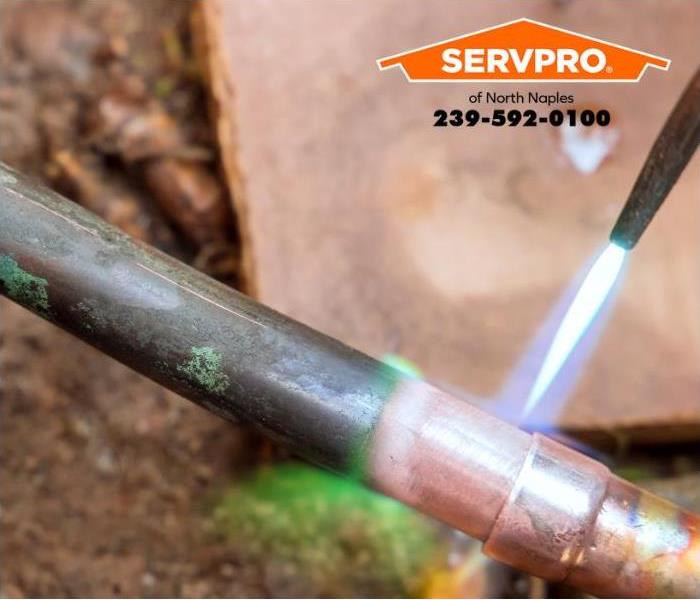 We restore water damage 24/7 in Collier County.
We restore water damage 24/7 in Collier County.
Our local North Naples team responds to water damage emergencies 24 hours a day in South Naples. A poor solder seam in your plumbing system can lead to persistent leaks and significant water damage over time.
Soldering is a common method used to join copper pipes, but if the process is done correctly, it can create strong joints that eventually fail. Even a small imperfection in the soldering can allow water to escape, slowly causing damage to your home's structure.
Leaks from poorly soldered seams often start small, making them difficult to detect until the damage is already done. Over time, the leaking water can cause wood rot, mold growth, and damage to drywall and flooring. In severe cases, the water can even compromise your home's foundation.
To prevent this, it's essential to have any soldering work done by a qualified professional who can ensure that the joints are properly sealed.
If you spot signs of a leak, like water stains or moisture near pipe joints, it's crucial not to overlook them. Addressing the issue early on can prevent more serious and expensive water damage later.
Routine inspections can identify potential problems before they escalate, helping to safeguard your home against the damaging effects of poor soldering work.
Call Us Today!
When your home or business in South Naples has water damage, our local team in North Naples is Here to Help. ® Contact us today at 239-592-0100.
SERVPRO® franchises are independently owned and operated.
The Devastating Impact of a Broken Pipe on a Naples Park Business?
8/27/2024 (Permalink)
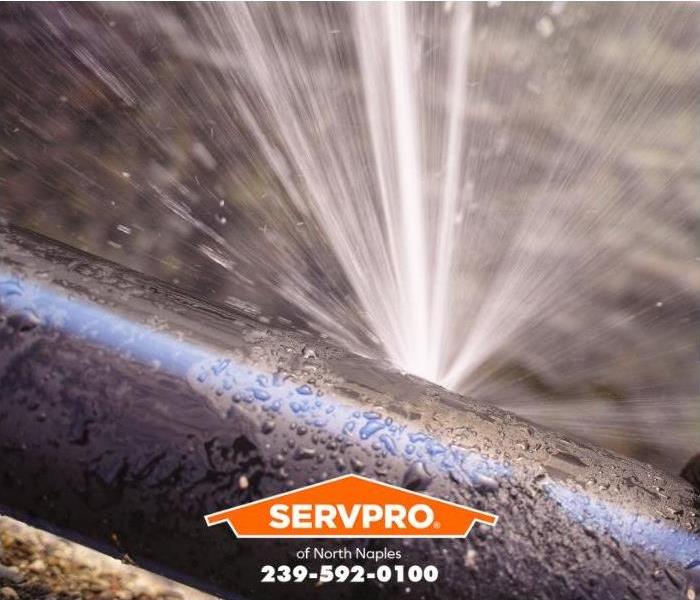 We restore commercial water damage 24/7 in Collier County.
We restore commercial water damage 24/7 in Collier County.
Our local team in North Naples has the training, equipment, and experience to restore commercial water damage in Naples Park – no matter how extensive the damage is. A broken pipe can cause catastrophic damage, disrupt operations, and cause significant financial loss. Water can quickly flood the premises, affecting everything from flooring and walls to critical business equipment and inventory.
Even minor leaks can quickly escalate into a significant problem. Water from a broken pipe can saturate carpets, warp wood, and damage drywall, leading to costly repairs and potential downtime for your business. Additionally, if the water comes into contact with electrical systems, it poses a severe risk of fire or electrical shock, endangering the safety of employees and customers.
The consequences of a broken pipe extend beyond just the immediate physical damage. When water is left unchecked, it can promote mold and mildew growth, which can quickly spread throughout the building and lead to costly repairs and extensive damage.
Acting quickly is essential to reducing the impact of a broken pipe. By promptly shutting off the water supply and reaching out to a professional restoration service, you can effectively limit the damage and begin the process of restoring your property. This rapid response is key to getting your business back up and running as soon as possible, minimizing downtime and additional losses.
Call Us!
When your Naples Park commercial business or home has water damage, our local team in North Naples is Here to Help. ® Contact us today at 239-592-0100.
SERVPRO® franchises are independently owned and operated.
Suffered a Flood? What to Do First | SERVPRO of North Naples
5/20/2024 (Permalink)
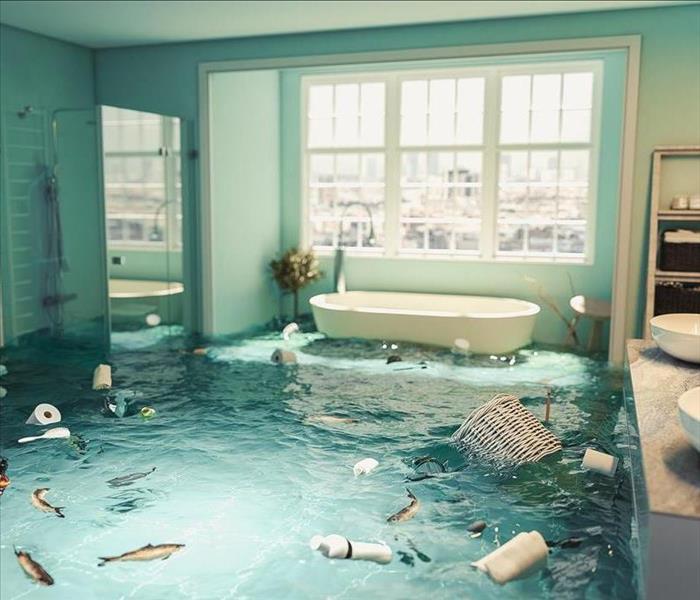 Has an unexpected flash flood invaded your home? SERVPRO of North Naples is here to fight back the water damage. Call us today!
Has an unexpected flash flood invaded your home? SERVPRO of North Naples is here to fight back the water damage. Call us today!
We are no strangers to the threat of water in the Naples community. Being so close to the ocean has its perks, but it also puts us in a position to experience the strong force of Mother Nature from time to time.
Whether a thunderstorm builds and dumps rain all over our community or a powerful hurricane comes barreling over the coast, we can all easily wind up with flooded basements and homes.
Knowing what to do before, during and after a flood can help you stay in control and stay safe.
Keeping Your Family Safe
The good news about hurricanes and other coastal storms is that we often get a few days of advance notice if there is one spotted over the ocean. You should start preparing for the possibility of the storm as soon as it is announced. Secure any patio furniture, grills or propane tanks, pull your car into your garage or carport every night, and try to clean up your yard as best as you can.
Inside your home, gather any important documents or fragile possessions and get them to a safe location. Check on your sump pump if you have one to make sure it is in good working condition, and close your storm or hurricane shutters tightly when the storm is about to make land.
When the Threat Has Passed
Fast-moving water can be dangerous, so stay put in your home until the water has stopped rushing in. If you had evacuated before the storm, wait until the authorities deem it safe to re-enter the community, but use extreme caution. Strong storms can cause extensive damage to buildings, homes and even nature itself.
Walk slowly and carefully around your home. Floodwater can easily damage the structural components of your home and can make it dangerous to walk around in.
Broken floorboards, loose nails and even the water itself can be hazardous to your safety. Once you have done your initial assessment, get us on the phone right away so we can get started on your flood restoration.
How Our Flood Restoration Works
We see flooding situations all the time, so we know just what to do when you give us a call. Our first priority is making sure we get to you as quickly as we can, as we know that the longer the water sits in your home, the worse your situation can become.
We will quickly start extracting the standing water, and we even have thermal imaging cameras that allow us to spot hidden moisture behind your walls and under your floors. We can even handle the restoration of fragile materials like soaked documents and soft objects like upholstery and cushions. Our team will confidently handle your repairs and restoration from start to finish.
Suffering a flood can be overwhelming. Let SERVPRO of North Naples handle your entire flood restoration.
Common Spots for Water Leaks | SERVPRO of North Naples
2/20/2024 (Permalink)
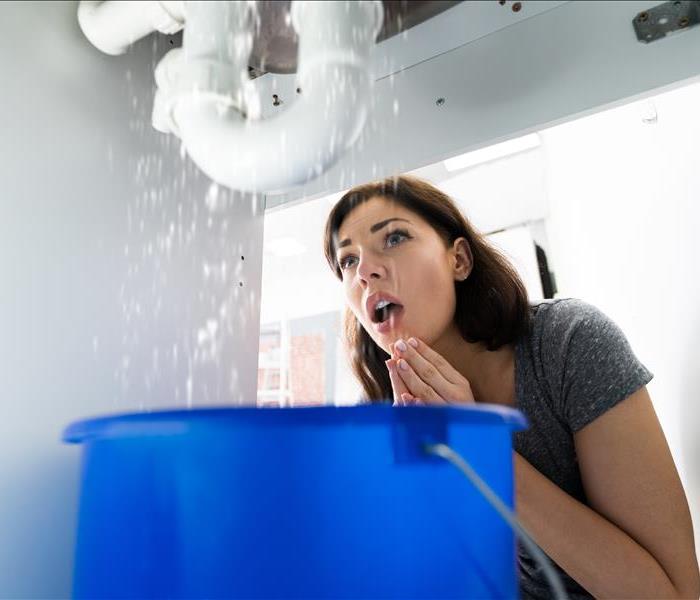 Water leaks can leave your home disastrous. That's why SERVPRO of North Naples is Here to Help®. Contact us today!
Water leaks can leave your home disastrous. That's why SERVPRO of North Naples is Here to Help®. Contact us today!
Water leaks can occur in singular obvious events, like from a burst pipe in your kitchen or a flooded basement due to a broken water line, but they can also be much sneakier. A single dripping pipe behind your walls or a water heater that leaks whenever it kicks on can cause just as much damage, but it will happen over a longer period of time.
No matter the situation, there is no doubt that water can cause serious and extensive damage. Catching a water leak early can help you control the situation, but first you have to know where to go looking for one!
Read on to learn more about where the most common locations are for water leaks in your home.
Common Leaky Spots
Water is constantly flowing in and out of your home, which means that water leaks can start virtually anywhere where a pipe is located behind your wall or where a water connection is.
A single loose water connection or a deteriorated caulk line can easily cause trouble for you. Checking the toilets, sinks and tubs in your home often can help you notice any lingering moisture or recurring puddles.
Another common spot for water leaks is around any appliance that uses water to function. We all rely on least one water-reliant appliance in our daily lives, but that doesn’t mean the appliance(s) in question can’t betray us!
Dishwashers, washing machines and water heaters can all start to leak at any point and cause a watery mess in an instant. Check each appliance every time before you turn them on, and feel for moisture around the doors and water lines.
Stopping the Flow
If you do discover lingering moisture anywhere in your home or find a new puddle on your floor, it’s time to take control to prevent the situation from getting any worse. Once you track down the original source of the leak, locate the appropriate water valve and shut it off immediately to stop the flow of water.
If the leak came from an appliance, shut off or unplug the appliance as well to make sure it can’t start back up again while you are figuring out the next steps.
Once the water has stopped flowing, avoid walking through the water and get us on the phone right away. If the water level was high enough or the situation went unnoticed for a while, you might have some residual water damage to deal with as well. Take some photos of the damage while you are waiting for us to arrive that you can show to your insurance company.
Water Damage Recovery
We will quickly arrive at your home and locate the source of the leak. We will get started on removing the water while addressing the necessary repairs.
We know that the longer water sits on your floors, the worse your damage can become and mold can even start to grow. Our industry-leading drying equipment will ensure every last drop of moisture has been removed from your home.
Once everything is dry, we will address any repairs that need to happen. Water can quickly warp wood and damage walls or carpet, but we can handle any sort of restoration projects that your space requires. Our goal is to make sure your home is returned to its preloss conditions as quickly as possible.
Tackling water damage quickly is essential to a full recovery. Contact SERVPRO of North Naples right away.
Causes of a flooded basement
3/9/2023 (Permalink)
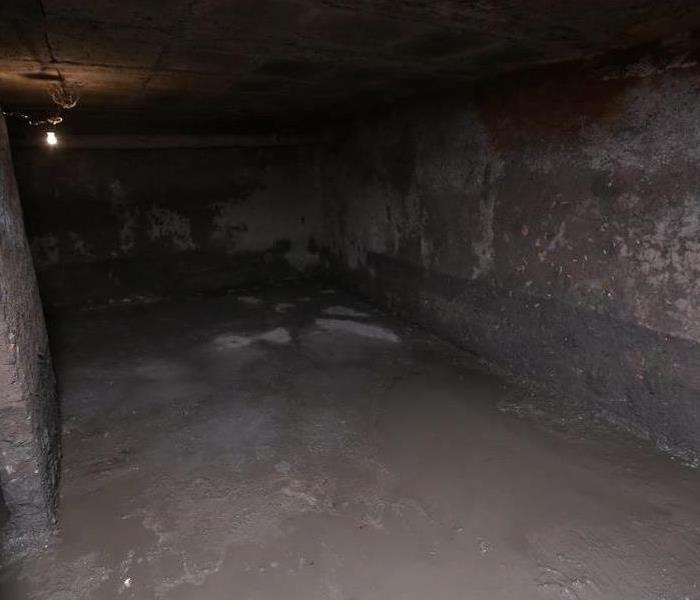 When your basement suffers from a flood, let us help.
When your basement suffers from a flood, let us help.
A flooded basement can be a nightmare. In addition to being messy and smelly, it can cause serious damage to your home. If you suspect that you have a flooded basement, call a professional at SERVPRO of North Naples who can help assess the problem and repair it.
Low water pressure
One of the most common causes of a flooded basement is low water pressure. Your home's plumbing system has to be able to supply enough water at the right pressure for all of your plumbing fixtures and appliances to function properly. If you have low water pressure, you may notice that:
- Toilets back up more often than usual because there isn't enough pressure in the pipes to push waste through them easily
- Showerheads spray water in all directions instead of just shooting straight out (this can be especially annoying when it happens while you're trying to get ready for work in the morning!)
- Your dishwasher leaks onto your kitchen floor because it doesn't have enough power behind its sprayer arm
Leaking water pipes
Leaking water pipes are the most common cause of flooded basements. Water damage can be expensive to repair, so it's important to check for leaks regularly and fix them as soon as you find them. If you notice that your basement is constantly wet or feels damp, it may be time to call in an expert.
Check all of your faucets and plumbing fixtures (such as toilets) for drips that could lead to a leaky pipe somewhere else in your home. You should also look at any exposed pipes near windows or doors where there might be temperature fluctuations that could cause condensation on the outside of these pipes over time
Overflowing toilet or dishwasher
There are some things that you can do to stop a flooded basement, but they're not necessarily easy and they're not always effective.
If your toilet or dishwasher is overflowing, then there's nothing you can do except call a professional plumber. These appliances don't have valves like sink faucets do; if the water fills up past its limit, it just keeps coming until it's drained out again by gravity or someone turns off the spigot supplying water from above ground level. You'll probably see signs of an overflowing toilet or dishwasher before this happens. A rising level in your basement floor near where those appliances are located is one sign but if they haven't been fixed yet and start leaking all at once (or worse yet start flooding), then you need emergency help right away!
Frozen pipe
If you live in an area that experiences cold weather, you may be familiar with the risk of frozen pipes. When water freezes inside a pipe, it expands and can cause the pipe to burst. This can result in a flooded basement or even worse--a flood throughout your home!
To prevent this from happening keep all faucets open when temperatures dip below freezing outside (this should be done regardless). If any pipes freeze anyway, immediately turn off your main water supply valve at the top of each faucet; then use an ice pick or screwdriver to chip away at any ice buildup until it's gone.
Broken sump pump
A sump pump is an important part of your basement drainage system. It should be checked regularly to make sure it's working properly and efficiently.
If you notice a problem with your sump pump, contact a professional immediately. Clogs around the pump or other issues can cause it to fail, leaving you with a flooded basement. If you do need to replace your sump pump, remember that they are available at hardware stores.
If you suspect that your basement is flooded, it's important to call a professional. A skilled technician will be able to assess the situation and determine whether or not there is any damage to your basement. They can also help you prevent future flooding and make sure that your home is safe from mold growth. If necessary, they'll help with insurance claims and other legal matters related to the flood.
Preventing a Water Damage Disaster from Your Washing Machine
2/9/2023 (Permalink)
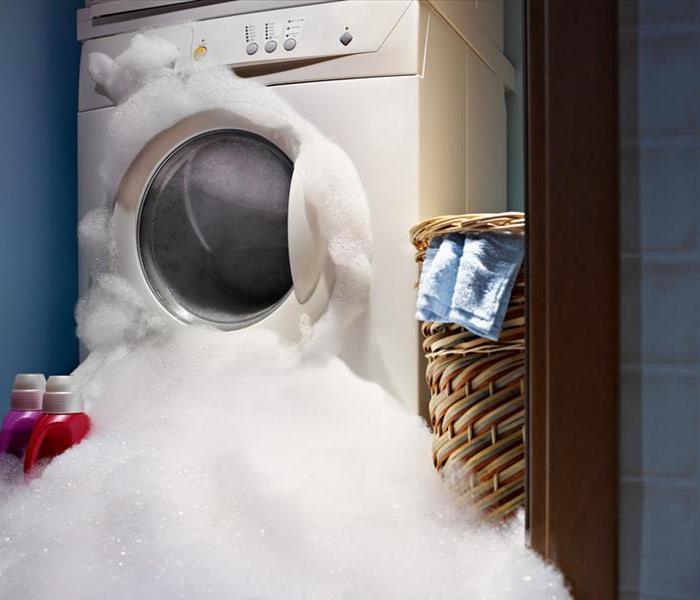 Prevent a water damage by checking your washer frequently.
Prevent a water damage by checking your washer frequently.
There are a number of events that can occur leaving water damage from a washing machine. A busted washing machine hose, overloading your laundry, seals and other damages can potentially leave you with water damage. Preventative measures keep this from happening by reducing the risk of a water damage disaster caused by washer machines.
Washing Machine Water Damage Prevention
Make sure you don't overload your washing machine. The maximum load size is marked on the washer's door or inside of the drum and should not exceed 2/3 full at any time. Overloading can cause excessive vibrations which may cause damage to your washing machine, or even worse, could make it tip over while it's running!
Regularly check for faulty hoses that lead into drains and replace them as soon as possible if they are cracked or damaged in any way (however small).
Check for Faulty Drain Hoses
To prevent a flood and other water damage, it's important to check your washing machine for faulty drain hoses. There are many ways that a drain hose can become damaged—cracks, corrosion, holes and even rusting. You should also look for any signs of wear or damage such as cracks or leaks.
If you notice any of these issues with your washing machine's drain hose, it may need to be replaced. This can save you money down the road because it would otherwise be necessary to replace only individual parts instead of everything at once!
Don’t Overload Your Washer
Don’t overload your washing machine. As a general rule, you should not wash more than 5-6 pounds of clothing in a full load and 2-3 pounds in a half load. Don’t wash too many clothes at once. The more clothes you load into the washer, the longer it takes to fill up with water and start washing them. Washing too many pieces at once can also put undue stress on your machine by causing excessive vibrations or adding excess weight and pressure to its components such as bearings and springs.
Check the Seal of Your Washer
Check the seal of your washer. If you haven't already, open the door and check the rubber seal around its opening. If it's torn or missing, a lot of water will leak from your washing machine when running. This can lead to mold or mildew problems that get into your walls and floors, which is definitely something you want to avoid.
If you have had a problem with your washing machine over time (ejecting clothes, leaking), be sure to check this area closely for any tears or holes that may have been caused by an unfortunate run-in between a heavy object and some part of the interior compartment of your washing machine during operation.
Regularly Checking and Replacing Hoses
How often should you check your washing machine hoses? The recommendation is to do so every six months, but it’s better to be safe and check them more frequently. If you have hard water or live in an older house, you may want to check them monthly.
How long should a washing machine hose last? Hoses can start to crack after three years of use, so it’s important that you replace them before this happens. If any part of the hose appears cracked or damaged, it needs replacing immediately for safety purposes.
There are simple things you can do to prevent water damage from your washing machine. It’s important to keep in mind that this is a serious issue and it could potentially cause thousands of dollars in damage if something goes wrong. If you take the proper steps, then you will not only be saving yourself money but also time since there will be no need for costly repairs or restoration services.
What Should I Do If I have Water Dripping From My Light Fixtures?
11/2/2022 (Permalink)
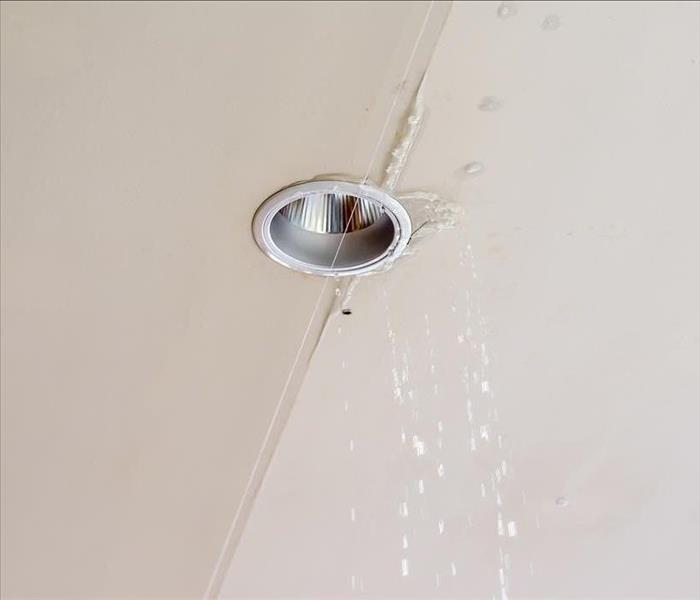 A light fixture can leak for a variety of reasons.
A light fixture can leak for a variety of reasons.
What to Do if Water Leaks from Your Light Fixture
Water leaks in your ceiling light fixtures can be alarming. You might think you have a plumbing problem, but it could also be caused by simple wear and tear. We'll walk you through the steps of diagnosing and repairing water damage caused by leaking light fixtures so that everything is back to normal, stat!
What Could Cause Water To Leak From a Ceiling Light Fixture?
A light fixture can leak for a variety of reasons. It could be the fixture itself, or it could be the wiring that connects to it. It could also be caused by problems with your home's plumbing system, or even issues with your roof.
If your light fixture is leaking, you need to pinpoint the cause of the leak as quickly as possible.
If the fixture itself is leaking, you may need to replace it. If the leak is caused by faulty wiring or plumbing issues, then you'll need to call a professional.
?The Dangers of Light Fixture Leaks
If you have water leaks from your ceiling light fixture, you’re not alone. These leaks are very common and can cause a lot of damage if they’re not taken care of quickly.
Light fixtures can leak for many different reasons, but there is one thing they all have in common: They need to be replaced by an expert as soon as possible. If you don't take care of these types of leaks right away, you could end up with some serious problems on your hands—including electrical hazards and other risks!
If your light fixture has started leaking recently, call your local electrician immediately for help with repairs. The sooner they get here, the better chance they have at preventing any further damage from occurring before it gets out of hand!
What to Do Before the Electrician Arrives
If you can, turn off the power to the fixture, this can help prevent any electrical risks. Find a bucket or container to catch the water and place it under your ceiling light to catch any water that is dripping and prevent any further damage from occurring. Next, locate an area where you can shut off your main water supply. This will completely stop any more water from leaking into your home.
Who to Call Next
Once you have called the electrician, the next step is to call a restoration company, like SERVPRO. The restoration company can ensure that the structural damage done by the leak is properly mitigated and restored. They will also ensure that you don't have any other hidden leaks present that might cause damage further down the road.
It's Best to Get it Fixed Right Away Before the Issue Gets Worse
If you have a water leak, it's best to get it fixed right away before the issue gets worse.
Water leaks can cause mold and mildew, which can lead to extensive damage to your property. If there is water in your ceiling lights, the moisture may seep down behind the drywall, causing damage to wires and wiring insulation. The water could also cause rot on wood walls or floors underneath; this can result in structural damage.
What To Do After Your Basement Floods
8/20/2022 (Permalink)
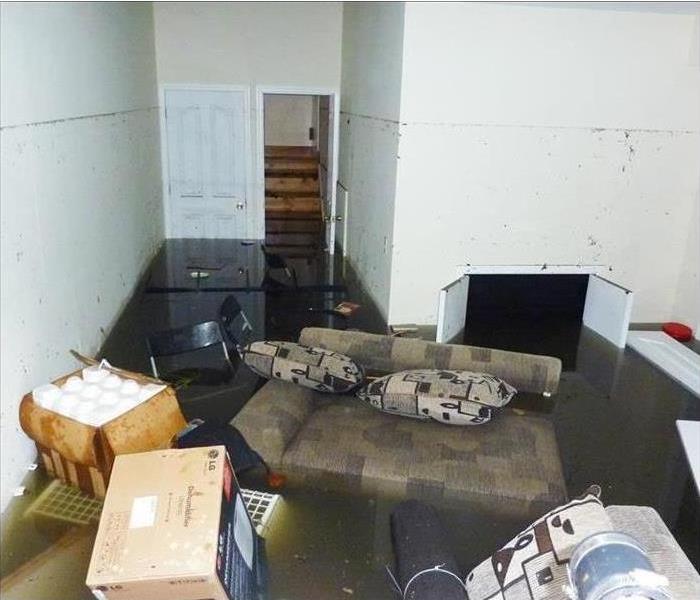 A flooded basement can cause lots of damage to your home.
A flooded basement can cause lots of damage to your home.
Steps to Take If Your Basement Floods
Even if you prepare for an impending rainstorm, water can still enter your Pine Ridge, FL, home. The lower level of a house is particularly prone to flooding. If you do experience a basement flood, follow the below steps.1. Avoid the Basement Until the Water Is Gone
Even a small amount of water can create an electrocution hazard. Ideally, you should keep everyone out of the basement until the water has been drained. You should also turn off any circuits within the basement. You can put some dry wood on the ground or stand on a ladder to access the circuits without getting wet.
If the water damage is minimal, you may be able to remove the water yourself with a vacuum. Plug the vacuum into an upstairs circuit, and keep all cords away from the fluid as you work. Be sure to wear rubber boots, as well.
A severe basement flood may cover the electrical outlets with water. This further increases the risk of electrocution. Ideally, these floods should only be handled by trained emergency restoration professionals. As long as you have proper insurance coverage, the cost of the cleanup should be relatively low.
2. Replace Equipment
The restoration experts may be able to salvage some parts of your basement, such as the carpet and drywall. However, you should discard and replace damaged mechanical and electrical equipment, including motors and appliances.
3. Prevent Future Floods
Once the cleanup is complete, you should take steps to limit future flooding. Consider installing a foundation drain or purchasing a backup sump pump. Sealing any cracks or flaws in the foundation can also prevent a basement flood.
A flooded basement can cause lots of damage to your treasured items. While you may be tempted to dry your belongings on your own, entering the lower level of your home after a flood can be dangerous. You should thus focus primarily on preventative measures and let the experts handle the repairs.
What to Know About Secondary Damage After Water Problems
7/13/2022 (Permalink)
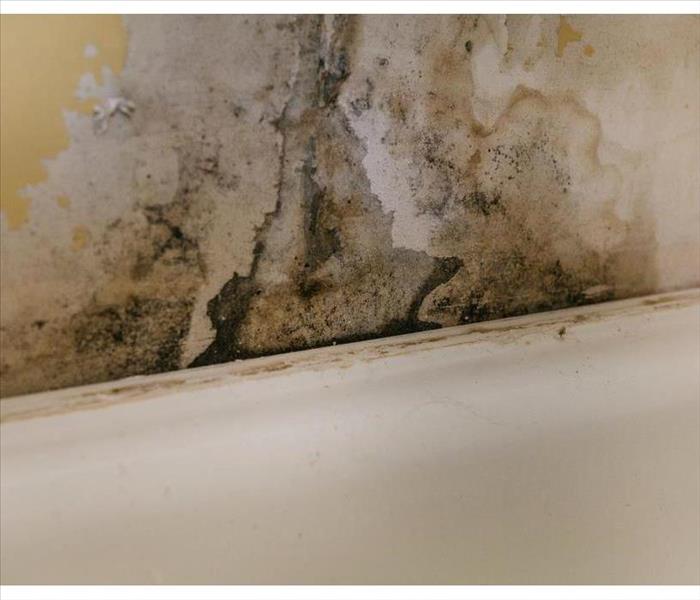 Water damage can lead to mold growth.
Water damage can lead to mold growth.
What to Know About Secondary Damage After Water Problems
After flooding at your East Naples, FL business you may have water damage. But did you know that if left unattended water damage can lead to secondary water damage problems such as black mold? Here are three additional problems you can prevent at your place of business by contacting a water damage restoration service to quickly restore the property.
1. Swollen Wood
Another aspect of water damage is that when left unattended it can lead to high humidity, which in turn can lead to warped or swollen wood. This particular problem can lead to additional structural damage when pieces no longer fit together correctly. If this becomes the case your restoration professional may have to replace some materials.
2. Mold Problems
In many cases, mold problems, including black mold, can arise from water damage that has been left unattended. The moisture can be a contributing factor to the habitat mold is most often grown in. with enough humidity, access to organic material such as wood, and some time, you may find your business property has a mold problem. Fortunately, many restoration services have the ability to deal with this problem as well as water damage.
3. Foundation Cracks
Another form of secondary damage that could occur is cracking in the property’s foundation. This can occur after standing water soaks in and begin to expand and contract with the presence of warming and cooling temperatures. Over time this can weaken the material of the foundation. If this is the case it’s best to consult with a professional.
If you’re looking to prevent long-term problems such as swollen wood, black mold, or foundation cracking at your place of business it’s best to contact a restoration service as soon as water damage is found.
How Safe Is It to Handle Each Type of Contaminated Water?
3/15/2022 (Permalink)
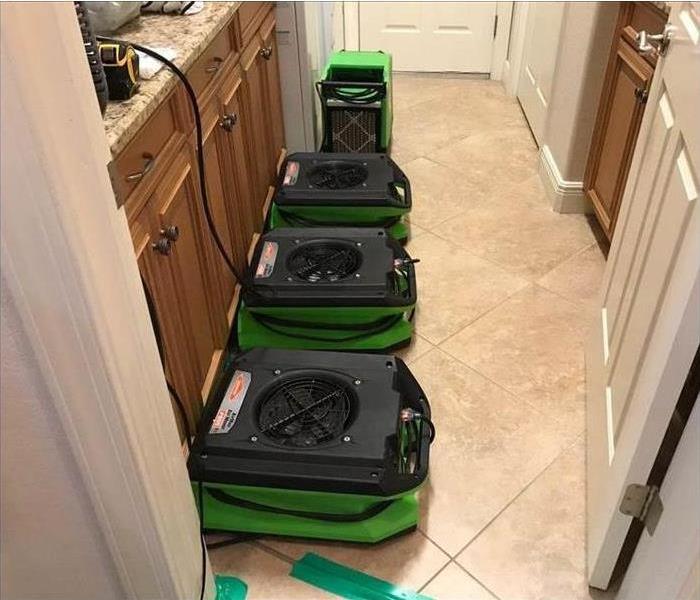 It is important to quickly dry out your property after a water leak.
It is important to quickly dry out your property after a water leak.
Types of Contaminated Water
Contaminated water can take many different forms. Some homes in Naples Park, FL will experience a flood of predominantly clean other while other abodes have to contend with black water. No matter what type of water came out of the supply line, you need to take quick action to have professionals remedy the situation right away.
1. Clean Water
While Category 1 water is called “clean” professionally, it may still contain substances that make it unsafe to drink. This type of water generally comes from a sink or tub. It may even pick up contaminants from the ground. For instance, tub water that overflows may pick up particles from the flooring outside of the tub. While you should avoid getting any Category 1 water in your mouth, it should not cause any ill side effects by simply pooling there.
2. Grey Water
Grey water, also known as Category 2 water, often comes from washing machines, dishwashers and sump pumps. It will contain physical, biological or chemical contaminants, but it will not consist of any fecal matter. Bacteria will likely be in it, so it can result in health complications if someone touches it. Sometimes even simply being exposed to this kind of contaminated water can result in health problems.
3. Black Water
Black water is the most dangerous type of water to be exposed to. Houses fill with this when water backs up from the septic tank, meaning there will often be fecal matter within the water. It can be extremely dangerous to be exposed to Category 3 water for an extended period of time.
No matter which category of water you have in your home in Naples Park, FL, you need to get it removed immediately. Standing water, regardless of the type of contaminants within it, can result in mold development. The contaminated water, as well as walls and other items exposed to the moisture, will need to be removed posthaste.
7 Steps To Take After a Pipe Breaks
1/23/2022 (Permalink)
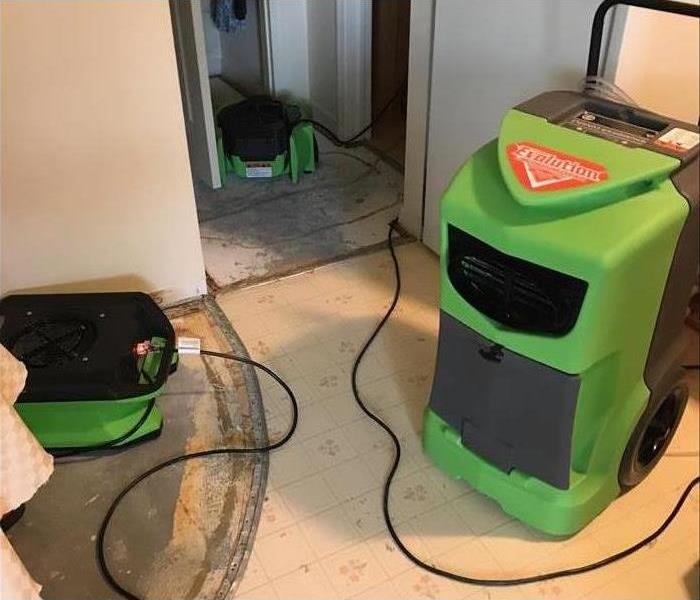 Water damage loss in Naples Lakes, FL.
Water damage loss in Naples Lakes, FL.
When a Pipe Breaks, Follow These 7 Steps
Whether water freezes and breaks a pipe or the pipe gets old and ruptures, bursting pipes are one of most homeowners’ worst nightmares in Naples Lakes, FL. Not only can the water quickly destroy the items inside the house, but it can also lead to other problems such as mold, mildew and pests. To slow the impact of the pooling water, take these seven steps.
1. Close the water valve.
Prevent further water from entering your home by turning off the water valve. If you can’t find a valve, turn off the water main in the street.
2. Call in the pros.
Contacting a water mitigation specialty team can speed your home’s recovery process. Not only are they knowledgeable, but they have the tools to fix a broken pipe and quickly renew your home.
3. Open a water faucet.
By opening a faucet on the same line as the leaking pipe after the water is off, any residual pressure can be alleviated.
4. Remove standing water.
Getting the water off the floor as quickly as possible can keep it from soaking down into flooring and up into walls. Stopping the water damage can save you not only money but also weeks of home repairs.
5. Sort through items.
Damaged items should be sorted as soon as possible into discard and salvageable piles. All wet items should then be removed from the area, with discarded items going to into the trash.
6. Ventilate the area.
Bursting pipes can leave the damaged area wet and muggy. To remove the humidity and help dry the area more thoroughly, ventilate the room. Open windows and set up fans to aid in the humidity transfer.
7. Call your insurance company.
Not all water problems need to be reviewed by an insurance adjuster, but if your damage is severe, call your insurance company and request they open a file.
Bursting pipes do not need to be a life-changer when you take these seven steps. You can be in control of keeping the water damage to a minimum, and that feels good.






 24/7 Emergency Service
24/7 Emergency Service













